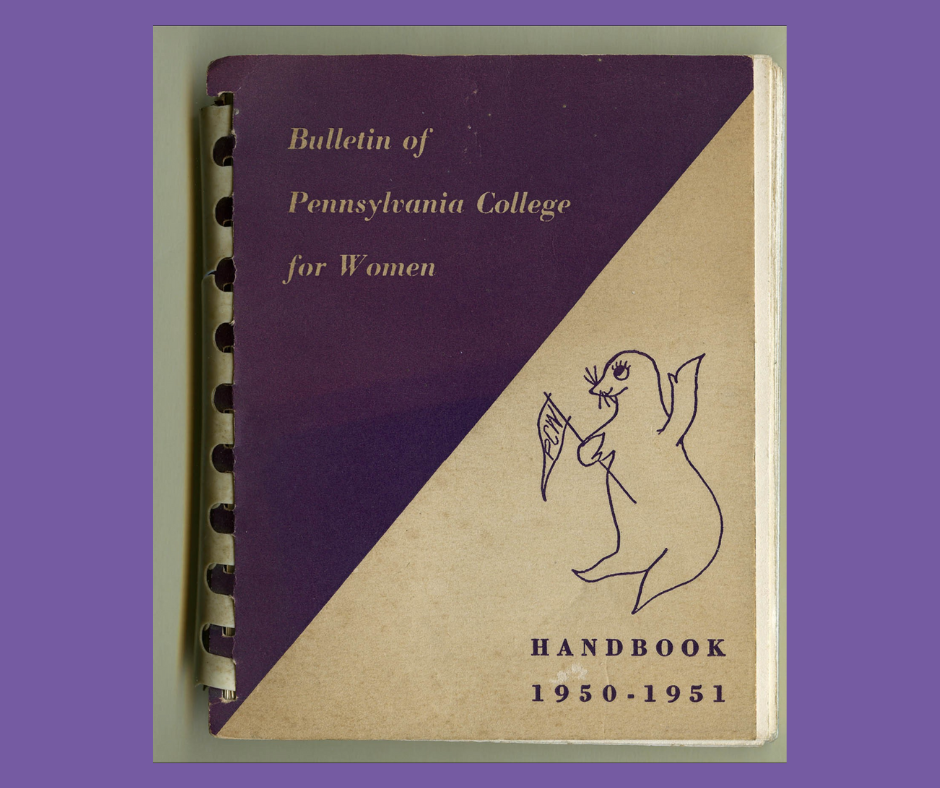Chatham’s Past Comes to Life During National Preservation Week
Forget the shuttle bus—Chatham’s Wagonette used to make regular trips from Fifth Avenue to the top of college hill. Here it is in the early 1920s.
If you wanted to spend National Preservation Week this week in the Chatham University archives with Molly Tighe, she might point you to some materials about the old buildings on campus, where you’ll see some structures that aren’t there anymore.
She might show you a few course catalogues so you can see how students used to spend their days in Chatham’s classrooms.
Or she might show you some scrapbooks, where old photographs give a candid glimpse of how student life has—and hasn’t—changed during the University’s 154-year history.
“One of the things that I think is really important about preserving the history of the University is the ability of that history to build and sustain University pride,” said Molly, the University’s archivist.
Whether the archives are being investigated by outside researchers, current students, or members of the University administration, there is enough history there for anyone to find something interesting, from written records dating back to the University’s founding to recent materials documenting the COVID-19 pandemic.
But of all the things from Chatham’s past that Molly would personally want to bring back, there is one she thought of first: “It would be fun to have a horse-drawn carriage,” she said. Somehow it’s not so hard to imagine the sound of clopping hooves coming down Woodland Road.
Then she remembered the fall holiday called Mountain Day.
“It was a smaller community of people, but they would go out to a more rural setting and have a picnic and play games and get off of campus, and that sounds like it was pretty fun,” she said.
She paused to think of another idea and concluded, “But yeah, I think the horse-drawn carriage would be pretty awesome.”
Students enjoy lunch on a Mountain Day picnic on the Allen Farm in the Brookside Farms development of Upper St. Clair.
Current Chatham students looking into the archive might be interested in seeing campus life through the eyes of former students via the scrapbooks in the collection. The oldest photographs have been there so long that they’re brittle.
“Some of the scrapbooks we have are really fantastic because they show student life, candid photos of students, from all decades,” Molly said. “Those can be used to identify both similarities among the student experiences that have occurred across all time, which I think is really special and a big piece of community-building.”
Pennsy the Seal, a former mascot, represented on the 1950-51 student handbook.
Many students also enjoy seeing pieces of Chatham’s history that have faded away. One example that’s grown in popularity is Pennsy the Seal, the University mascot who preceded Carson Cougar.
Other aspects – the considerably lower costs of tuition in the 20th century, in particular – draw students’ attention when they’re going through the archive for class research. A recording of a speech given by the broadcast journalist Max Robinson provided material for a recent student project.
“A student did a short documentary film about Max Robinson, about that speech,” Molly said. “It was a really wonderful way for a student to take an item that was in the Chatham University collection and connect it to broader themes that impact journalism and equity.”
Deciding what to save often comes down to a list of priorities, Molly said. Old film may be scanned and digitized because it is likely to decay, while other materials like the scrapbooks are placed into the collection because of popular interest.
The potential use for research and the risk of the materials being lost are two of the biggest reasons to add things to the archive, Molly said.
But research is just one aspect of what students and other patrons can take away from the wealth of materials in the archive, Molly said.
The collection also shows how much impact students have had over the course of Chatham history. The first name change from the Pennsylvania Female College to the Pennsylvania College for Women, for example, was initiated by students.
“There are just tons of examples where you can see students developing their ideas about the university and working with the administration to find a way to make that happen,” Molly said.
“I think that’s a really powerful piece for students looking at the archive, they can see the impact students have made and empower them to make that impact themselves in Chatham and beyond.”
To see more, visit the Chatham University Archives site or follow them on Facebook and Instagram.
Mick Stinelli is a Writer and Digital Content Specialist at Chatham University. His writing has previously appeared in the Pittsburgh Post-Gazette and 90.5 WESA, and he has a B.A. in Broadcast Production and Media Management from Point Park University. Mick, a native of western Pennsylvania, spends his free time watching movies and playing music.



